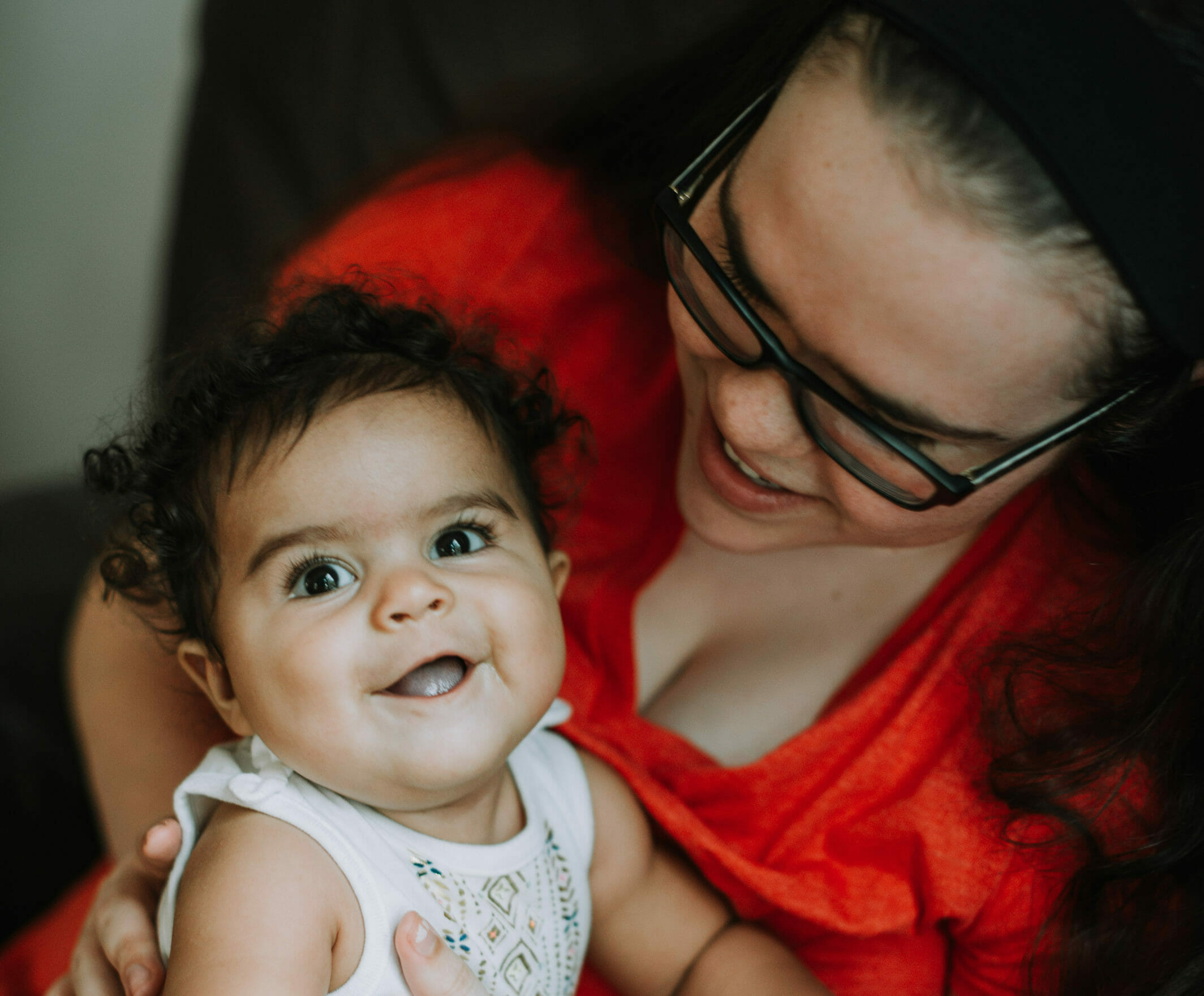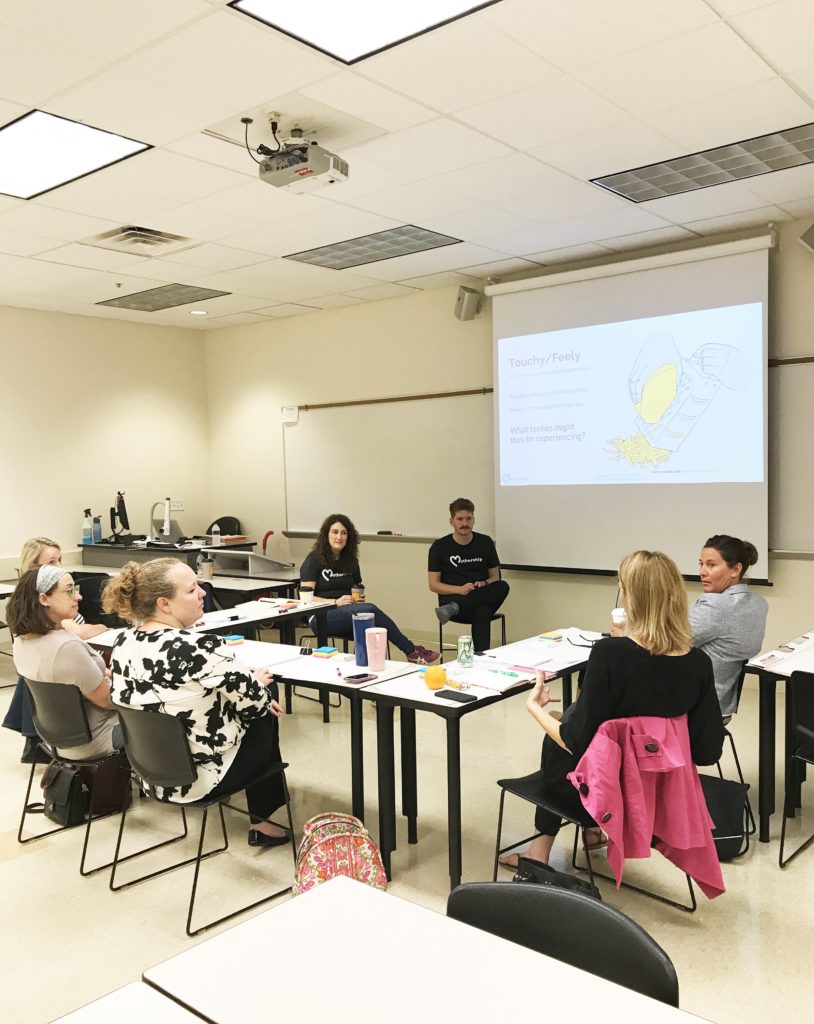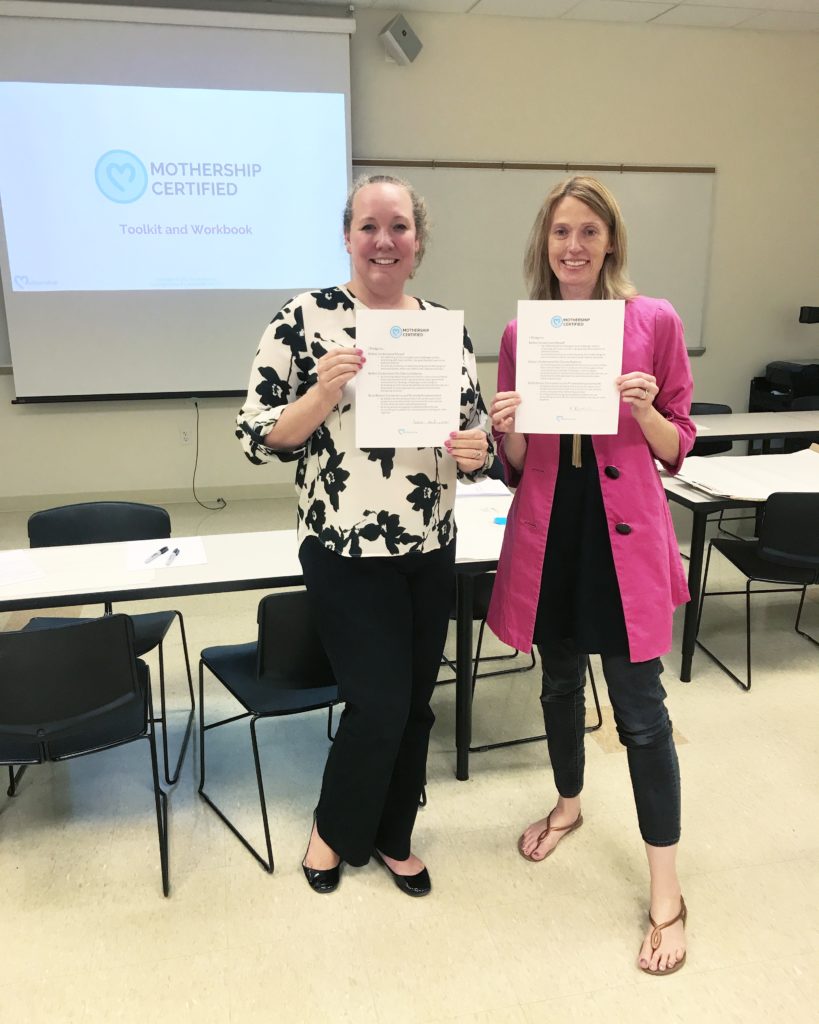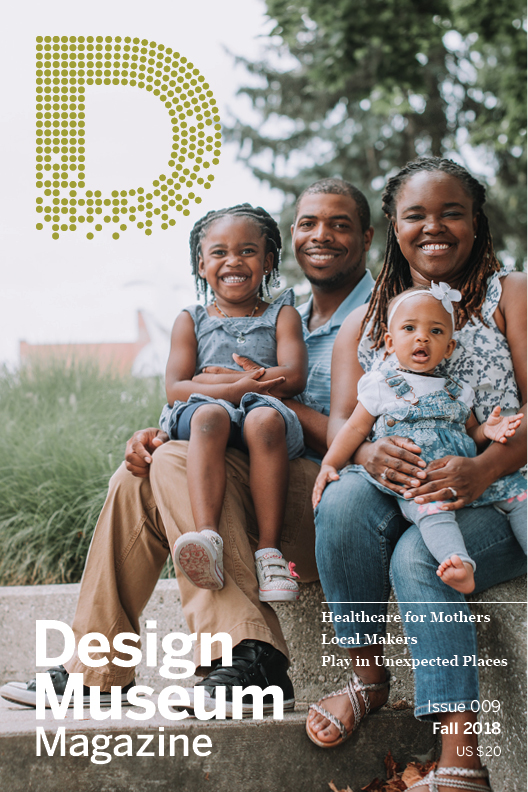Mothership
Embedding Empathy into Health Culture
What happens when the design process is embedded into the healthcare system for parents? Mothership was created to find out.
Images courtesy of Liz Lyszyk and Mothership

By Martelle Esposito, MS, MPH
In Texas, Christine attended her follow-up appointment with the pediatrician after the birth of her first son. She recalls that “they made us wait for over three hours after four sleepless days of breastfeeding challenges in the hospital. The doctor came in and decided to give the baby a bottle, saying something about people wanting to feed babies with spoons and droppers like ‘damn goats’ and that there’s nothing wrong with a bottle. I remember just sitting there with tears rolling down my eyes, feeling like a huge failure.”
In New York, Jenny did not anticipate that her team of health professionals would brush aside her feelings and wishes during and after she gave birth. “I labored at home for 24 hours before going to the hospital,” she says. “That’s when everything went wrong. I knew what was going on in my body, but the doctors wouldn’t listen to me. Afterward, I dreaded the visits with the lactation consultant because she made me use techniques that I found painful, even when I voiced my concerns.”
In California, Geetika was pregnant with twins. A vegetarian, she asked her doctor how she might meet her unique nutritional needs. “The doctor gave me some brochures for mothers pregnant with multiples,” she says, “but when I looked at the nutrition advice, it suggested eating additional meat.”
And in Washington, D.C., Sarah had an uncomfortable interaction: “A lactation consultant told me she didn’t approve of ‘those,’ pointing at my daughter’s pacifier. This was really annoying because both my babies were much happier with them.”
While not reflective of every parent’s experiences, stories like these are far too common. I heard many such stories during my five years working in the maternal and child health industry. I focused on public health programs and policies targeting pregnancy and early childhood nutrition, breastfeeding, and access to health care services. There had to be a better way, one where health care experiences were more positive, personalized, empathetic, and empowering – especially during the vulnerable and transformative time of becoming a parent.
Seeing the need for change, I was inspired to start a nonprofit, Mothership. With guidance from our board of directors (a group of seven design and public health experts), I use design to develop a better healthcare experience for parents. Mothership is working to change our healthcare culture by training professionals who work with parents to see empathy as foundational to their work. That way they are better equipped to build connections and empower their patients.
Empathy Research Approach
Merging design thinking with methods of public health problem-solving, I established a hybrid approach to uncover more information about parents’ negative experiences with healthcare and develop new solutions. Interestingly, many public health and design thinking tools are similar or complementary, so using tools from both fields provides an opportunity to enhance research and development outcomes.
Both in public health and design thinking, the first step is empathy through understanding the key people involved in the issue and how they are affected by it. This involves examining the gap between what a patient population needs and what it currently has access to. In public health, we also study quantitative data on health outcomes and risk factors. We scour censuses, health records, other population-level reports, and scientific journals. Sometimes we also collect qualitative data from surveys and interviews. For Mothership, we researched and studied data on millennial parents, millennials and healthcare, parents and healthcare, and healthcare trends.
We also interviewed parents about their prenatal, birth, and postpartum experiences,
with an emphasis on nutrition and breastfeeding. We also interviewed health service providers to learn about their goals regarding nutrition and breastfeeding when working with parents.
Over the course of the entire research and development process, we conducted individual interviews and group sessions with approximately 50 parents and healthcare providers. We also observed patient-provider interactions. Finally, we looked at the landscape of organizations, programs, and resources currently available to families.
Here’s what we learned about parent experiences with health care prenatally, during birth, postpartum, and in early childhood: Parents have a range of inconsistent experiences, and many families are not getting the support they want. Millennial parents want to make their own decisions. They consider their health service providers one of many sources of information.
With many parents turning to family, friends, the internet, and social media for support, they have difficulty finding credible and relevant information. People have many different opinions about parenting. Parents sometimes feel they will be judged regardless of their choices. Parents trust advice from other parent friends, sometimes more than advice from health professionals, because they’ve “been there.” Parents have a desire to be seen and heard, and they want their health care professionals to view their well-being as a priority in line with their baby’s. Many new mothers feel isolated during their child’s first few months. Because of this, they actively seek the company of other mothers, both online and in-person, and recommend other mothers do the same.
Here’s what we learned about health service provider experiences working with parents: Many healthcare providers say that they are constrained by time and pressured to move quickly from patient to patient. They have so much to do in a day that they struggle to find time for relationship-building. One provider even noted that she was recently marked down on her performance evaluation for spending too much time with each patient. Additionally, with so much information to collect and record, paperwork and recordkeeping often become a burden. With compensation for health systems tied to patient satisfaction and outcomes, it takes a higher priority than in the past. Healthcare providers are motivated to provide good care to their patients and want them to achieve their health goals. Even if doctors and nurses are motivated to provide good care, they often do not have the time or money for a complete overhaul. They are interested in opportunities that they can easily implement. Some are motivated to provide personalized, empathetic, and empowering care, but it can be difficult garnering support from their entire group or practice to make changes. They are interested in making changes on their own.
Some notes about the existing landscape: Many organizations exist in the maternal and child health industry to improve health outcomes. In fact, some clinics are already doing great work with empathy and empowerment. Interest in patient-centered care is trending.

Towards a Solution
We determined that Mothership could add value to existing work by solving the disconnect between the current health system and what millennial parents actually want: a parent-centered approach grounded in empathy.
One story from a mother we interviewed was particularly compelling as we began to think about how t0 address this challenge. “My best mom-friend is also a nurse,” Betsy said. “She understands me, doesn’t judge, and also has medical knowledge.” We thought, wouldn’t it be wonderful if everyone had such a friend? We began to start thinking about potential solutions from this lens: bridging the gap between health expert and friend.
When designing a new healthcare program, it is important to engage your target community during the development process. We engaged our target community through the co-creation ideation method – a process of creating right alongside stakeholders to ensure the outcomes both meet their needs and are usable. The Mothership team brainstormed and created accompanying visuals as starting points for discussion. Then we began a series of virtual sessions with parents and healthcare professionals. One of the most promising ideas to emerge was a training and certification program for health service providers on empathy and empowerment practices.
Finishing Touches
In the final stage of public health program research and development, we define program details with specific measurable objectives and test it out in a pilot. This stage is analogous to the prototyping, testing, and iterating phase of the design process. The difference is that a public health pilot program often takes years to test, collect data, and report on.
To streamline the process, we set up a “rough” pilot program – an imperfect prototype – so that we could test and iterate the curriculum quickly. While the short turnover time prevented us from measuring larger trends, like culture change, we nonetheless managed to understand (in a broader sense) the educational activities that were achieving the group’s learning goals and which ones were not. That way, we could increase the likelihood of successful outcomes when we launched a more rigorously studied pilot. The program that came out of this experimentation is called Mothership Certified.
Mothership Certified
Drawing from research in psychology, human-centered design, and human behavior, the Mothership Certified training and certification program provides knowledge and tools for health service providers to build connections and better promote empowerment when working with millennial parents.
Developed by two experience designers, Jeff Sprague and Joey Zeledón, as well as myself, with input from other experts, the eight-hour workshop is a cross-section of several topics related to empathy, connection, and empowerment. It meets the needs of parents seeking to be seen and heard – not judged – as well as health service providers looking for easy-to-implement reforms. It all takes one day and costs roughly the same as a one-day registration for a health conference, making it accessible to existing professional development budgets and timeframes.
Furthermore, we focus on knowledge and tools relevant to a range of health professionals and paraprofessionals at a variety of skill levels. The workshop is also designed to enhance larger health system initiatives.
For us, it is important to encourage continued learning and growth, even after participants finish the program. This is where the certification comes into play. After training, participants sign a pledge to reflect on and implement what they’ve learned into their own practice. They are encouraged to put this pledge somewhere they will see every day.
Early Impact
After almost a year of curriculum development, testing, and refinement, Mothership Certified has officially launched. To date, 11 people have completed training and are Mothership Certified: one lactation consultant, three nurses, one licensed social worker, and six doulas.
In the most recent iteration of the eight-hour training workshop, we had six participants. All were women and were doulas, and there was one nurse-doula. We held a debrief session immediately after the training and follow-up interviews with each participant one week later. The group said that they found the content valuable and the format engaging. They also said they would recommend the training to others, especially for groups who work together. When asked about the most valuable parts of the training and what they had begun to implement in their practice, they collectively covered the main content in all sessions in their answers. The one nurse in the group, who also had much previous exposure to these topics, even noted, “I’ve learned a lot of the things that were taught in the training [before], but it was still beneficial to reinforce the things I already knew and to re-evaluate where I am on my own personal journey.”
Another participant felt that “even if you are an empath, you are going to learn something. I think it’s great for a practice’s staff to take together. I really think everyone should take it.”
A majority of participants reported that the greatest impact so far is that they are more self-aware of their biases, body language, and stress. A majority also noted that they have been or plan to be more intentional about their actions and reactions with clients. One participant shared, “it’s helped me be more intentional about listening, and I’m also more aware of my biases. It was encouraging to hear that we all have biases, and I’m thinking about it in my practice.”
Another notes that “I definitely think others should take the training because it can help us become more intentional with our client relationships. A lot of health service providers need that in my experience. It’s really easy when you are in a position of authority, the expert, to just tell people what to do, but our clients have brains and can make decisions for themselves.”
One last unintended impact of the training is that a majority of participants reported that they have also used different tools from the training outside work. One participant noted how it helped her in a job interview. Another said it helped her with interactions with her family and it impacted her second job. We also had someone who recommended that her husband take the training with his employees: “I told so many people about it. I told my husband he should do it with his restaurant staff. I thought it was full of rich content.”
Future Plans
Mothership Certified is approved for continuing education credits for lactation consultants and nurses in some locations, and we plan to apply for continuing education credits for different professionals as the program grows. We are also developing a virtual version of the training, so more people can access it as well as an online community with continued learning opportunities. We plan to study outcomes related to changes in attitudes, behaviors, patient satisfaction, and system culture. We hope to eventually integrate the certification into existing review sites and databases of healthcare providers. It is our vision that our logo becomes a symbol of empathy and empowerment for all parents.
Learn more about Mothership at ourmothership.org

